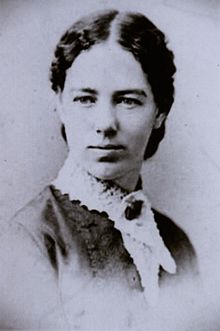Clara Bewick Colby
Clara Bewick Colby | |
|---|---|
 | |
| Born | August 1, 1846 |
| Died | September 7, 1916 (aged 70) |
| Occupation | Writer - Journalist |
| Signature | |
Clara Dorothy Bewick Colby (1 August 1846 – 7 September 1916) was a British-American lecturer, newspaper publisher and correspondent, women's rights activist, and
In addition to being a suffragist and newspaper publisher, Colby was a lecturer, an interpreter of
Family, education and intellectual development
Colby was born in
At the age of nineteen, Colby went to
Activist
Colby edited a department in the Beatrice Express called "Woman's Work," and in 1883, she founded, published, and edited The Woman's Tribune. For several years, she was deeply interested in the movement for woman's enfranchisement, devoting her journal to the advocacy of this reform. The Woman's Tribune took the prize at the Paris Exposition in 1900 for its neatness and workman-like appearance, and it filled an important place in the history of the suffragist cause, being for a time the recognized organ of the National Woman Suffrage Association.[3] A contemporary and friend of Elizabeth Cady Stanton, Susan B. Anthony, and Dr. Mary Edwards Walker, Colby lectured extensively not only to general audiences, but before legislative and congressional committees.[6] In 1888, at the time of the great International Council of Women in Washington, D.C. Colby published the Tribune daily during the week of the council, and continued it through the Woman's Suffrage Convention the following week. It is probably the first instance of a daily woman's paper being published by a woman.[3] During the period of 1885–1898, she served as president of the Nebraska Woman Suffrage Association,[5] and in 1895, she served as the chair of the Federal Suffrage Committee.[8] She spoke in behalf of the soldiers of the Spanish–American War (1898); during the Spanish–American War, she was officially appointed as war correspondent, the first woman to be so recognized. She was also an advocate of peace at the Panama–Pacific International Exposition in San Francisco, California in 1915.[3]
Lecturer and author

With an interest in esoteric spirituality, Colby was a contributor to Stanton's
- "Delia Blanchflower," Mary Augusta Ward's new woman suffrage novel
- "Austria-Hungary, Its History and Conditions"
- "Florence Nightingale"
- "Women in the Building of America"
- "Woman's Work in English Fiction"
- "Bohemia, and the Burning of John Hus"
- "Euripides, and his Types of Greek Women"
- "The Lion with Seven Darts in His Paw."
- "Hroswitha Who Wrote Dramas a Thousand Years Ago; and Women of the Monasteries"
- "Fanny Burney and Dr. Johnson"
- "Rudolph Eucken, and the New Religious Idealism"
Personal life

Clara married Leonard in 1872 and they removed to
References
 This article incorporates text from this source, which is in the public domain: E. C. Stanton's "History of Woman Suffrage: 1876–1885" (1886)
This article incorporates text from this source, which is in the public domain: E. C. Stanton's "History of Woman Suffrage: 1876–1885" (1886) This article incorporates text from this source, which is in the public domain: O. Brown's "Democratic Ideals: A Memorial Sketch of Clara B. Colby" (1917)
This article incorporates text from this source, which is in the public domain: O. Brown's "Democratic Ideals: A Memorial Sketch of Clara B. Colby" (1917)- Holliday, John (2019). Clara Colby: The International Suffragist. Gold Coast Australia: Tallai Books. ISBN 9780648684800.
- ISBN 978-1-932792-53-9.
- ^ a b "Lost Bird of Wounded Knee". South Dakota Public Television. Retrieved 17 August 2014.
- ^ a b c d e f g h i j Brown, Olympia (1917). Democratic Ideals: A Memorial Sketch of Clara B. Colby (Public domain ed.). Federal Suffrage Association. p. 13.
- ^ Croly, Jane Cunningham (1898). The History of the Woman's Club Movement in America. H. G. Allen & Company. p. 340. Retrieved 3 December 2022.
 This article incorporates text from this source, which is in the public domain.
This article incorporates text from this source, which is in the public domain.
- ^ ISBN 978-0-8240-5306-2.
- ^ a b c Stanton, Elizabeth Cady; Anthony, Susan B.; Gage, Matilda Joslyn; Harper, Ida Husted (1886). History of Woman Suffrage: 1876–1885 (Public domain ed.). Fowler & Wells. p. 670.
- ^ "Stephen and Clara Medhurst Willingham Chilton". Wisconsin Historical Society. December 2003. Retrieved 17 August 2014.
- ^ Convention; National American Woman Suffrage Association Collection (Library of Congress); Susan B. Anthony Collection (Library of Congress) (1895). Proceedings of the Twenty-Seventh Annual Convention of the National American Woman Suffrage Association, held in Atlanta, Ga., January 31st to February 5th, 1895 (Public domain ed.). The Association. p. 29.
- ^ a b "Colby, Clara (1846–1916)". Encyclopedia of the Great Plains. University of Nebraska–Lincoln. Retrieved 17 August 2014.
- ^ ISBN 978-0-674-62734-5.
Further reading
- John Holliday: Clara Colby : the international suffragist, Gold Coast, Australia : Tallai Books, [2019], ISBN 978-0-648-68480-0
External links
- Clara Bewick Colby at Find a Grave
 Media related to Clara Bewick Colby at Wikimedia Commons
Media related to Clara Bewick Colby at Wikimedia Commons
